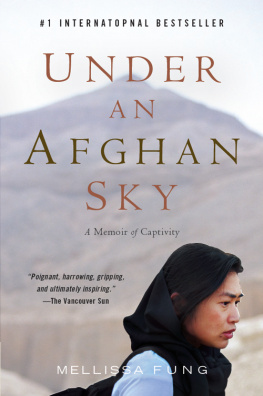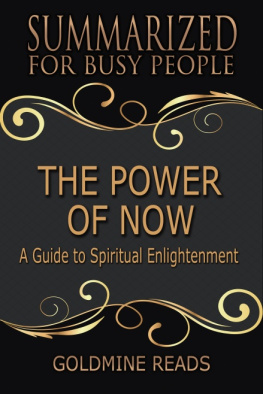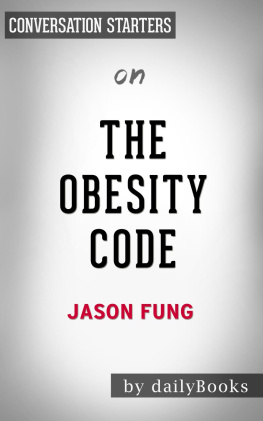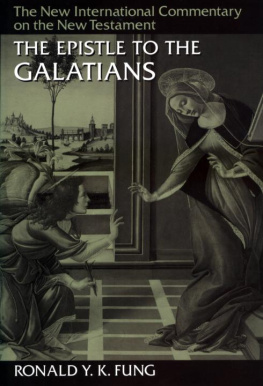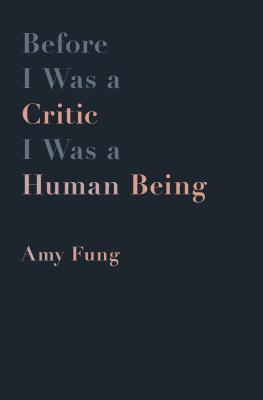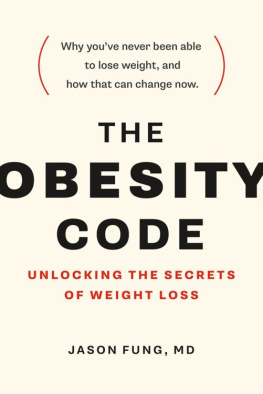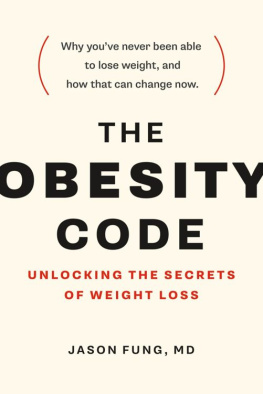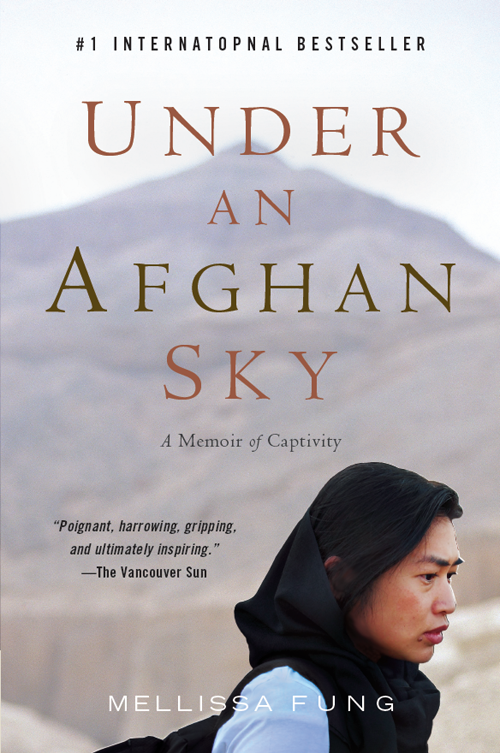I looked up from where he had me pinned to the floor of the car. It had all happened so fast. My heart was pounding, and I still wasnt sure what was going on, except that I was staring up the barrel of a Kalashnikov. There were two men in the back of the car with me and one in the front, in the drivers seat. The men in the back tried to cover me with my black scarf, which I wore over my head whenever I ventured out into the real streets of Afghanistan. I struggled, but it was useless. They were pressing my camera bag in my face in an attempt to cover me up, in case we passed any police while the car sped away from the refugee camp. I tried to look out from underneath the scarf. I wanted to see where we were going.
I suddenly noticed I was bleeding. Huge red bloodstains spread over my blue-and-yellow flowered kameez. Blood was pouring out of my right shoulder and my right hand. One of the two men in the backthe tall onewas on a cell phone, speaking loudly and rapidly to someone who was barking back in Pashto, the language spoken in the south of the country. I had no idea what they were saying, but I knew deep down that it wasnt good.
Whats your name? asked the man.
Mellissa, I answered, and he demanded to see my passport. I didnt want to give it to him, but he started to search me. I had it in the left pocket of my hiking pants and fished it out for him.
Canada. You not from America? Or Britain?
No. Canada, I replied as another warm gush of blood oozed out of my shoulderthough I felt no pain.
The man made another phone call and, between bursts of Pashto, I could hear him say Canada.
I looked up at the door handle and instinctively reached out with my right arm to pull it, only to feel the pain of a worn leather shoe smacking down my hand. The other man, who had curly hair, pointed his bloody knife at me, glared at me with angry black eyes, and shouted, No!
Where are we going? I asked.
We are almost there. Ten minutes more.
Ten minutes earlier, I had been working in the relative safety of Charahi Qambar refugee camp, just northeast of Kabul. My fixer, Shokoor, and I had gone there on a sunny Sunday morning, October 12, 2008, to interview people who had fled the fighting in Kandahar and other southern provinces of Afghanistan.
Id arrived in Kabul the day before, flying up from Kandahar Airfield, where I was based for my second rotation covering the war, and in particular, Canadas military efforts in the south. As a journalist for CBC News reporting on mostly Canadian stories, I had been excited by the prospect of travelling again to Afghanistan. There are few opportunities for domestic reporters to get a taste of conflict zone reporting, and I was determined to make the best of it. I was fascinated by the country and the Afghans Id met the year before on my first assignment there, and I wanted another chance to tell their stories. The fighting in the south had intensified over the past several months, and thousands were forced to flee their homes in Kandahar, Helmand, and Uruzgan provinces to set up temporary shelter in the safer areas of the north. This camp just outside Kabul was one of them.
It was only eleven oclock in the morning when I arrived but already unbearably hot. A thick stench, emanating from the open sewers that ran through the camp, filled the air.
Wed spent just about an hour there, no longer. Shokoor was very careful about taking me around the city, knowing there is always a risk when foreigners in Afghanistan venture out. I tried to blend in as much as possible and always kept my head covered with a scarf. Wed interviewed several families that had recently arrived at the camp. One woman told me shed lost her husband, two sons, and a daughter to a suicide bomber. She told me her life story as we sat outside her makeshift shelter where she lived with her remaining childrenthree little boys and a girlas well as her puppy and another dog. She said she was maybe forty years old (Afghans dont celebrate birthdays), but the lines that creased her brown face made her look at least twenty years older. She had kind eyes, though, and a soft smile. I couldnt help but stuff a few hundred afghanis in her hand as I was leaving.
Her family shared their small space with another family from Kandahar province, a family of six or seven, and as I left her, I saw everyone gathering around a small firefifteen or sixteen people, waiting for a tiny pot of white rice to cook. It would be their meal of the day. Little did I know then how much of a luxury white rice would become for me.
After wed finished our interviews, Shokoor and I ran into a group of people from the Office of the United Nations High Commissioner for Refugees (UNHCR) whod been visiting the camp. The United Nations provided some assistance to the people who lived there, but the refugee situation in Afghanistan and neighbouring Pakistan was becoming critical. Tens of thousands of people had been displaced by the fighting, and there was nowhere for them to go. We made arrangements to stop at the UNHCR office next, to talk to the director about the plight of the refugees. The UN car left, and we made our way back to Shokoors white Toyota Corolla. His brother was our driver that day, and he was waiting for us just outside the entrance to the camp.
The sun was beating down on us, and I was eager to get going. The UN interview would round out the story. And then we were going to visit a school in the centre of Kabul, funded in part by the Canadian International Development Agency (CIDA), for children who had been orphaned by the war. It was a busy day. But I was going to be in Kabul for only three days and I had four stories to shoot.
That was good, I said to Shokoor as we walked on the dirt road leading out of the camp. He was holding the small digital camera we were shooting with, while I carried the camera bag and the knapsack with my radio equipment. Everything was going well. I knew I had an important story with the refugeesvery few Western journalists had been to this camp.
Just then, a blue car sped toward us from the camp entrance and squealed to a stop next to us, kicking up a small dust storm. Three armed men got out and pointed guns at us. The shortest of them grabbed me and tried to push me head first into the car. Shokoor! I screamed as I struggled with the man. In a reflex action, I swung my right fist at his nose. I noticed a glint from the end of a knife and then felt something stick into my shoulder. My heart was racing, but I didnt feel pain, and I wasnt scared for myself. Rather, my overriding fear was that they would kill Shokoor. I saw him covering his head with his arm as one of the men pointed a gun in his face. I squeezed my eyes shut to brace myself for the inevitable sound of a gunshot.
Shokoor! I shouted again as I was shoved into the back seat of the car. Call Paul! Dont go to the police!
The car sped away, kicking up another dust storm in its wake. From the back window, I could see Shokoor running to the road, the camera still hanging on his shoulder. I continued to struggle in the car, swinging my fists as the men shoved my head down to their feet with the butts of their guns. The car smelled of gasoline and sweat. I tried to look up to see their faces but one of them held my scarf to my face and the other kept his foot on my back, not allowing me to move.

